
Girls are at increased risk of child marriage, violence and stigma while schools remain closed. From Kenya, to Mozambique, to Nepal, find out what VSO is doing to support.
Home is supposed to be a safe place. However, for millions of children, that’s sadly not the case.
Globally, over one billion of the world’s students are currently stuck at home due to school closures.
According to a recent VSO assessment in Nepal, this is having devastating consequences, especially for girls’ education.
Nicola Whybrow, a Nepal-based VSO volunteer, reports that many girls are juggling schoolwork with working on their parent’s land or doing household chores.
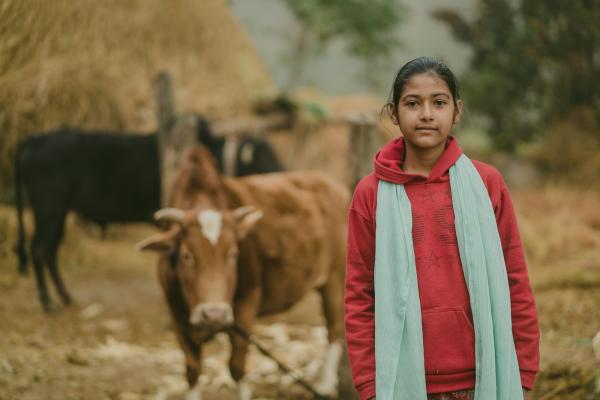
“In the first three weeks of lockdown 81% of the marginalised girls we work with were engaging in regular study without receiving any guidance from teachers.
“At the same time, 89% were engaged in domestic or agriculture labour and this was the biggest barrier to learning. This will affect education and some students may never return to school.”
Girls around the world are less likely to finish school and to do well in their education, due to patriarchal attitudes that devalue girls.
VSO’s programmes in Nepal and elsewhere have succeeded in making sure both girls and boys thrive at school, in part by engaging communities to change their attitudes and understand girls’ rights. But now it seems with schools closed, many of the stigmas and negative attitudes towards girls are creeping back.
What's more, families are under severe stress from the threat of coronavirus, mounting financial pressures and the intensity of being quarantined inside the home together. This is sometimes creating toxic living conditions for children, and anecdotal evidence frrom our projects and partners suggests that rates of gender-based violence and child marriage are on the rise.
“I thought I would die too”
Volunteer 'big sister' Joya Parvin, 18, mentors 22 ‘little sisters’ on the Sisters for Sisters’ Education project in Parsa district, Nepal. Her community is now under strict lockdown as coronavirus cases increase.
The biggest challenge for girls here is accessing menstrual hygiene products, as well as access to soap, hand sanitiser and clean clothes.
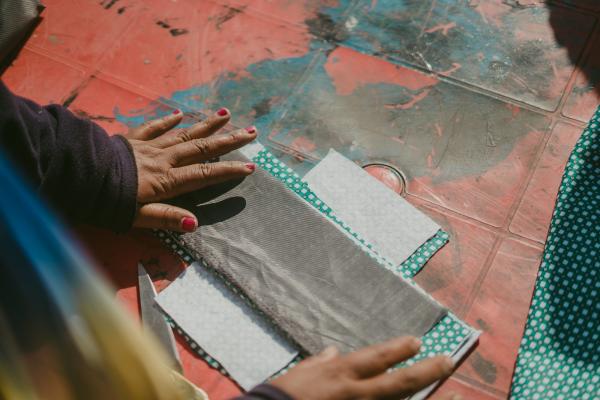
In Joya’s community all the shops are closed and the pharmacy that sells sanitary pads is out of stock. Those who can afford it have already stocked up, leaving the poorest and most marginalised girls without any sanitary towels.
“During this lockdown, I heard from my little sisters that they cannot access sanitary products. I called them and taught how to make re-usable sanitary pads at home.”
Volunteers and big sisters are joining up with teachers and community members in distributing hygiene kits to around a thousand households, reaching more than 4,000 family members. These kits contain a towel, toothbrush, toothpaste, reusable sanitary pads, underwear, nail clippers, soap for bathing and soap for washing clothes. Volunteers like Joya are also helping to dispel misinformation around coronavirus.
“I was very scared to hear that there were positive cases of COVID-19 in my village. I thought I would die too,” says Rami Khatun, one of Joya’s little sisters.
Joya is in frequent contact with all her little sisters and their parents to provide information on coronavirus and menstrual hygiene management.
“Big sister Joya called me and my family and told us not to panic, and sent us ideas to keep ourselves healthy. I have been washing my hands more frequently and do not go out of the house”.
“I want to make each girl feel she is loved”
Seventeen-year-old Clemenia* grew up in a family enduring extreme poverty, in Migori, Kenya. Clemenia has Down's Syndrome and had never been to school, until a VSO education project offered a lifeline in the form of catch-up classes.
With the help of VSO-trained teacher Rael, Clemenia was delighted to finally be in a classroom learning. However, the outbreak of COVID-19 forced her local catch-up centre to close.

Christine Gati, who is an education facilitator at one of the catch-up centres, fears what girls might be going through now they are unable to come to class:
“I’m supporting 32 girls during this lockdown. Some are married, with husbands who are now out of work. We’ve heard stories of girls quarrelling with their husbands, of some girls being beaten by their husbands.”
Thankfully for girls like Clemenia mentors and teachers on the project have been maintaining regular contact by phone to check in on their progress. VSO provided each girl with a workbook so she can continue to study at home.
Clemenia is also one of 739 out-of-school girls across Migori and Isioli counties to receive a hygiene kit, vital in fighting the spread of the virus. The kits contain soap, sanitary towels, underwear, toothpaste and petroleum jelly.
Life is still challenging for Clemenia, but teachers like Rael can make an incredible difference:“I chat to the girls about their problems and encourage then to continue with their education. I want to make each girl feel she is loved.”
Untying the knot
In Mozambique, a country with one of the highest rates of child marriage, coronavirus is now placing girls at an even greater risk of becoming child brides.
“Young girls are often forced into marriages to older men, with parents receiving a lobola, an offering of money from the husband,” says Mozambique country director, Ria Kulenovic.
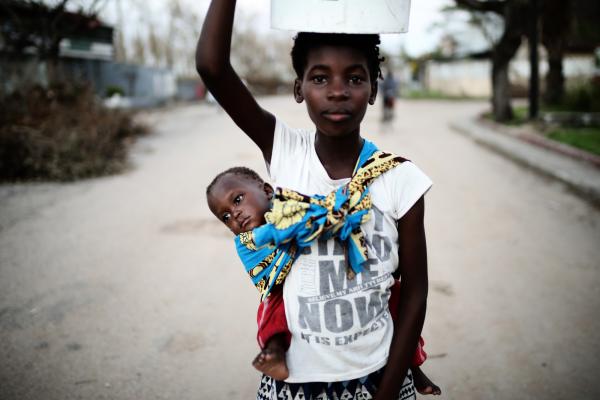
“More than 60% of Mozambicans live below the poverty line, so for them marrying off their daughters can relieve the family of the burden of feeding another child. Food security is a big issue in these communities.”
One father said, “The girls here get married early because that's how it should be. When they get married we get money that shows their value. Going to school spoils their future, because then they do nothing."
Prior to the coronavirus outbreak, unemployment in Mozambique already stood at 24.8%. This is likely to increase. So far, 500 companies are planning to pause business, likely leading to the loss of thousands of jobs.
With the threat of financial insecurity looming, VSO is offering at-risk girls a path out of poverty.
A project, funded by the Canadian government and titled Empowering Adolescent Girls to Learn and Earn (EAGLE), will give 3,000 vulnerable and out-of-school girls in two of Mozambique’s poorest provinces a second chance at an education - and the opportunity to support themselves.
From day one, girls will receive financial support to attend educational classes covering basic literary and numeracy skills, life skills and a solid grounding in business, employment and entrepreneurship.
VSO is now urgently recruiting for skilled education professionals to join as volunteers on the EAGLE project in Mozambique.
The EAGLE project is currently in the planning and preparation phase, ahead of roll-out in February 2021, but coronavirus has prompted VSO volunteers to create contingency strategies depending on how the pandemic progresses in Mozambique. The country currently has close to 900 cases of COVID-19.
“Right now, Mozambique is under emergency lockdown. We don’t know what the situation will be a month from now,” says Ria Kulenovic, country director for Mozambique.
“We know these girls are extremely vulnerable, many have HIV, are pregnant or have disabilities. There’s so much we don’t know about the virus, but it’s very possible that for those who are malnourished, coronavirus could be far more deadly. The risk is significant.”
Ria KulenovicWe’ve had to recalibrate very quickly, and we soon realised that rural areas aren’t receiving the right messages about COVID-19. People need to understand what the threat is.
Mozambique country director
A study conducted by VSO through social media with 140 young people unearthed some of the common myths around the prevention of the spread of coronavirus, such as taking vitamin C, avoiding canned foods and alcohol, and avoiding noise pollution.
In response, the team has translated SMS text messages and radio announcements into local languages, and leaflets into braille. The radio announcements, across Sofala and Manica provinces, have a potential reach of over 400,000 people, in some of Mozambique’s most rural and isolated communities. The hope is that everyone will know what to do to keep themselves safe.
Will you stand alongside vulnerable girls?
During this pandemic, the communities we work in need more support than ever before. Girls are facing monumental challenges just to live, stay healthy, and access education, without fear of becoming a child bride or experiencing violence.
As long as the pandemic continues to impact vulnerable communities, we will continue to assess the changing needs of girls and adapt our programmes accordingly.
We are doing all we can to support the girls most affected to make sure no one is left behind. You can help us in this mission by making a donation to our coronavirus appeal.
Read more
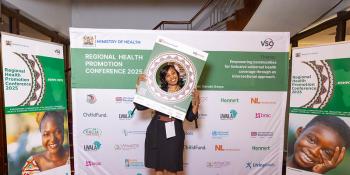
In photos: Our Regional Health Promotion Conference 2025
Check out some of our favourite photos from Regional Health Promotion Conference (RHPC25). This event sought to reimagine Universal Health Coverage through the lens of intersectionality.
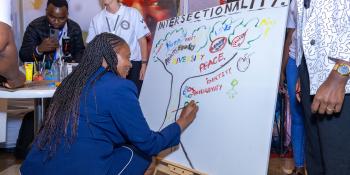
Using intersectionality to create healthy beginnings and hopeful futures
World Health Day brings global attention to the urgent need to end preventable maternal and newborn deaths. Learn more about how our Regional Health Promotion Conference is tackling these issues head on.
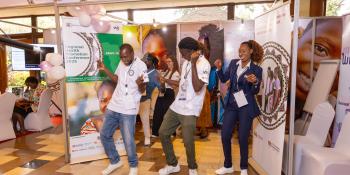
Highlights from the Regional Health Promotion Conference 2025
The Regional Health Promotion Conference 2025 reimagined Universal Health Coverage (UHC) through the lens of intersectionality, by bringing together experts from across East Africa and beyond.
